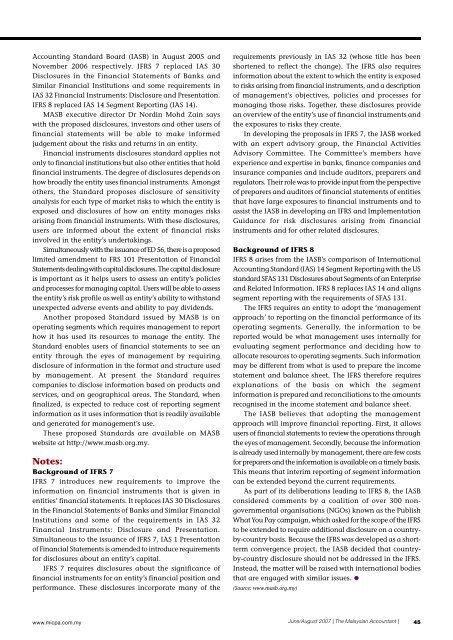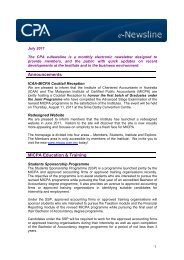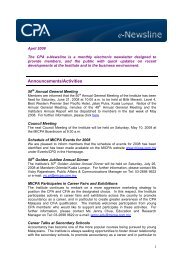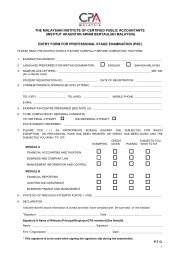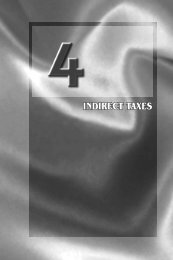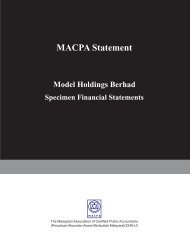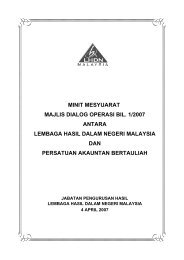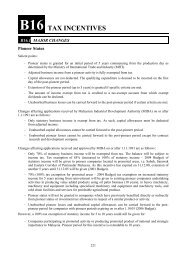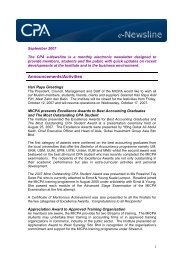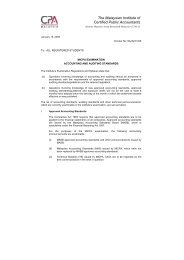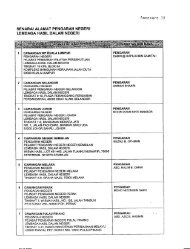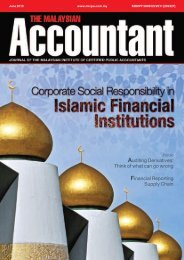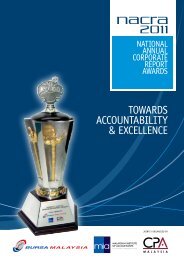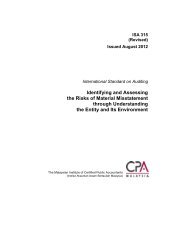The Malaysian Accountant - The Malaysian Institute Of Certified ...
The Malaysian Accountant - The Malaysian Institute Of Certified ...
The Malaysian Accountant - The Malaysian Institute Of Certified ...
Create successful ePaper yourself
Turn your PDF publications into a flip-book with our unique Google optimized e-Paper software.
Accounting Standard Board (IASB) in August 2005 andNovember 2006 respectively. IFRS 7 replaced IAS 30Disclosures in the Financial Statements of Banks andSimilar Financial Institutions and some requirements inIAS 32 Financial Instruments: Disclosure and Presentation.IFRS 8 replaced IAS 14 Segment Reporting (IAS 14).MASB executive director Dr Nordin Mohd Zain sayswith the proposed disclosures, investors and other users offinancial statements will be able to make informedjudgement about the risks and returns in an entity.Financial instruments disclosures standard applies notonly to financial institutions but also other entities that holdfinancial instruments. <strong>The</strong> degree of disclosures depends onhow broadly the entity uses financial instruments. Amongstothers, the Standard proposes disclosure of sensitivityanalysis for each type of market risks to which the entity isexposed and disclosures of how an entity manages risksarising from financial instruments. With these disclosures,users are informed about the extent of financial risksinvolved in the entity’s undertakings.Simultaneously with the issuance of ED 56, there is a proposedlimited amendment to FRS 101 Presentation of FinancialStatements dealing with capital disclosures. <strong>The</strong> capital disclosureis important as it helps users to assess an entity’s policiesand processes for managing capital. Users will be able to assessthe entity’s risk profile as well as entity’s ability to withstandunexpected adverse events and ability to pay dividends.Another proposed Standard issued by MASB is onoperating segments which requires management to reporthow it has used its resources to manage the entity. <strong>The</strong>Standard enables users of financial statements to see anentity through the eyes of management by requiringdisclosure of information in the format and structure usedby management. At present the Standard requirescompanies to disclose information based on products andservices, and on geographical areas. <strong>The</strong> Standard, whenfinalized, is expected to reduce cost of reporting segmentinformation as it uses information that is readily availableand generated for management’s use.<strong>The</strong>se proposed Standards are available on MASBwebsite at http://www.masb.org.my.Notes:Background of IFRS 7IFRS 7 introduces new requirements to improve theinformation on financial instruments that is given inentities’ financial statements. It replaces IAS 30 Disclosuresin the Financial Statements of Banks and Similar FinancialInstitutions and some of the requirements in IAS 32Financial Instruments: Disclosure and Presentation.Simultaneous to the issuance of IFRS 7, IAS 1 Presentationof Financial Statements is amended to introduce requirementsfor disclosures about an entity’s capital.IFRS 7 requires disclosures about the significance offinancial instruments for an entity’s financial position andperformance. <strong>The</strong>se disclosures incorporate many of therequirements previously in IAS 32 (whose title has beenshortened to reflect the change). <strong>The</strong> IFRS also requiresinformation about the extent to which the entity is exposedto risks arising from financial instruments, and a descriptionof management’s objectives, policies and processes formanaging those risks. Together, these disclosures providean overview of the entity’s use of financial instruments andthe exposures to risks they create.In developing the proposals in IFRS 7, the IASB workedwith an expert advisory group, the Financial ActivitiesAdvisory Committee. <strong>The</strong> Committee’s members haveexperience and expertise in banks, finance companies andinsurance companies and include auditors, preparers andregulators. <strong>The</strong>ir role was to provide input from the perspectiveof preparers and auditors of financial statements of entitiesthat have large exposures to financial instruments and toassist the IASB in developing an IFRS and ImplementationGuidance for risk disclosures arising from financialinstruments and for other related disclosures.Background of IFRS 8IFRS 8 arises from the IASB’s comparison of InternationalAccounting Standard (IAS) 14 Segment Reporting with the USstandard SFAS 131 Disclosures about Segments of an Enterpriseand Related Information. IFRS 8 replaces IAS 14 and alignssegment reporting with the requirements of SFAS 131.<strong>The</strong> IFRS requires an entity to adopt the ‘managementapproach’ to reporting on the financial performance of itsoperating segments. Generally, the information to bereported would be what management uses internally forevaluating segment performance and deciding how toallocate resources to operating segments. Such informationmay be different from what is used to prepare the incomestatement and balance sheet. <strong>The</strong> IFRS therefore requiresexplanations of the basis on which the segmentinformation is prepared and reconciliations to the amountsrecognised in the income statement and balance sheet.<strong>The</strong> IASB believes that adopting the managementapproach will improve financial reporting. First, it allowsusers of financial statements to review the operations throughthe eyes of management. Secondly, because the informationis already used internally by management, there are few costsfor preparers and the information is available on a timely basis.This means that interim reporting of segment informationcan be extended beyond the current requirements.As part of its deliberations leading to IFRS 8, the IASBconsidered comments by a coalition of over 300 nongovernmentalorganisations (NGOs) known as the PublishWhat You Pay campaign, which asked for the scope of the IFRSto be extended to require additional disclosure on a countryby-countrybasis. Because the IFRS was developed as a shorttermconvergence project, the IASB decided that countryby-countrydisclosure should not be addressed in the IFRS.Instead, the matter will be raised with international bodiesthat are engaged with similar issues.(Source: www.masb.org.my)www.micpa.com.myJune/August 2007 | <strong>The</strong> <strong>Malaysian</strong> <strong>Accountant</strong> |45


